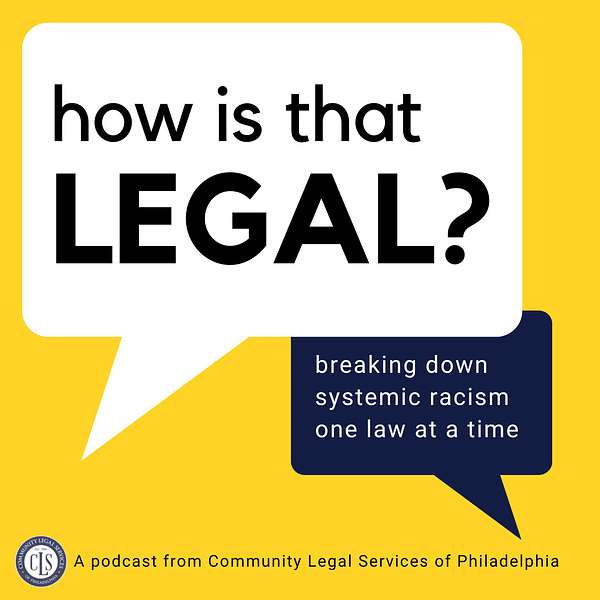
How Is That Legal?: Breaking Down Systemic Racism One Law at a Time
How Is That Legal?: Breaking Down Systemic Racism One Law at a Time
Season 2 is Launching on February 1st!
How Is That Legal is back and better than ever in Season 2! Kee Tobar, Chief Equity and Inclusion Officer of Community Legal Services of Philadelphia, invites experts from a wide range of backgrounds to break down examples of systemic racism in the law and policy. By the end of each episode, you’ll understand the forces behind everyday injustices that make us ask, “How in the world is that legal?” Airing weekly on Wednesdays wherever you get your podcasts.
If you enjoy this show and want to help fight poverty and injustice, consider making a donation to Community Legal Services today! You can also follow us on all social media @CLSphila to stay connected.
How Is that Legal is produced by Rowhome Productions. Jake Nussbaum is our Producer and Editor. Executive Producers are Alex Lewis and John Myers. Special thanks to Caitlin Nagel, Zakya Hall, and Farwa Zaidi. Music provided by Blue Dot Sessions.
Kee Tobar (00:01):
Hello everyone. Welcome back to How Is That Legal?, the podcast where we break down examples of systemic racial inequity in the law and policy and talk to experts whose stories of injustice will make you ask, "How in the world is that legal?"
(00:16):
I'm Kee Tobar, your host. I'm a civil legal aid attorney, history enthusiast, and Chief Equity and Inclusion Officer at Community Legal Services of Philadelphia. We're so excited to share season two of How Is That Legal? with you all. In our first season, we were proud to cover topics like housing justice, the family regulation system, also known as the child welfare system, and environmental inequity. However, season one only scratched the surface of these deep-seated issues. And yep, systemic racism is still alive and well, shape-shifting and blending until what was once overt and wrong now seems circumstantial and maybe even reasonable.
(00:56):
This season, our goal is to spotlight the systemic racial discrimination found in civil systems that impact every facet of our lives, from determining who is disabled to regulating housing to establishing the parameters of our neighborhoods and who can afford to live in them.
Nikil Saval (01:12):
"In terms of the public housing market, because housing over time largely became very segregated, it was seen as a provision for black residents and the kind of conservative movement in this country, which just decided that we shouldn't be providing housing to black people in the United States. And so they felt like it was necessary to disinvest from it."
Monty Wilson (01:36):
"There was an inherent bias there of, "Well, the gentrification benefits the city. The gentrification was good for this neighborhood. I did get the benefit of being house rich, but what am I supposed to do to pay my taxes?" That question the city is still struggling with."
Sofia Ali-Khan (01:52):
"It's come into the culture. Right? There's a consciousness that this is a continuing colonial project and that native people are still here and need to be acknowledged, and it needs to acknowledge that this is their rightful homeland. Right? So we see an incredibly vitriolic battle over rights and reparations. But there's a way to get from point A to point B where people have enough of that backstory to say, "Okay, that's a legitimate conversation. We need to have that conversation."
Lauren DeBruicker (02:19):
"There is a group of disability rights activists who occupied the federal building in San Francisco. The FBI cut off the phones to try to get them to leave. They cut off running water to get them to leave. But they found ways to stay there. The Black Panthers brought them food. And I think that's a point of history that really resonates with me because it emphasizes the point that other social activists, other civil rights groups recognized that the lack of access for people with disabilities was a civil rights issue."
Kee Tobar (02:53):
I almost feel badly for teasing you with these excerpts, but you won't have to wait for long. Please be sure to subscribe to How Is That Legal? wherever you get your podcasts. If you want to ask questions about the show or let us know what you think, please email us at podcast@clsphila.org. Also, while Community Legal Services of Philadelphia offers free legal assistance on a range of civil legal issues, we are not a criminal defense firm. So if you live in Philadelphia and are looking for noncriminal legal help, please visit us at clsphila.org. We cannot respond to questions about legal issues via email. Season two of How Is That Legal? was produced by Rowhome Productions. Jake Nussbaum is our producer and editor. Executive Producers are Alex Lewis and John Myers. Special thanks to Caitlin Nagel, Zakya Hall, and Farwa Zaidi. Music provided by Blue Dot Sessions. I'm your host, Kee Tobar.
